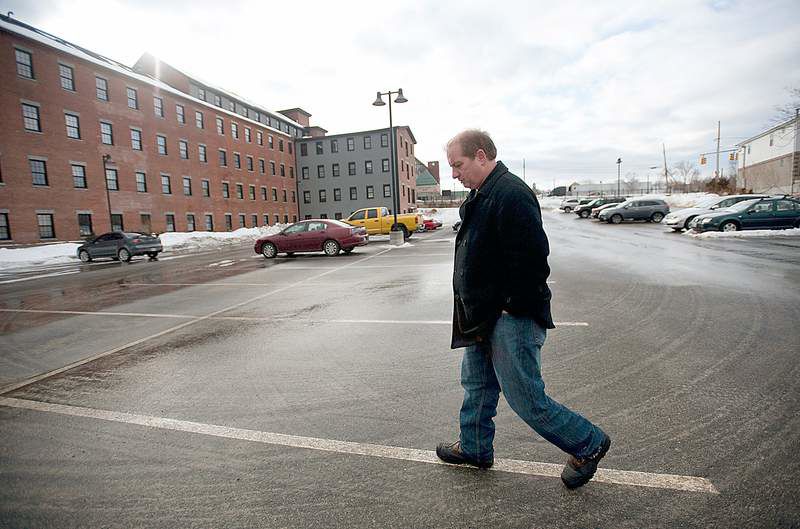Another job lost in the recession: the mayor’s
Published 4:00 am Wednesday, February 23, 2011

- Mayor Charles Moreau walks through a parking lot where he hopes to build a chocolate factory in Central Falls, R.I., on Feb. 8. Moreau has been demoted to an advisory role since a state-appointed receiver took control of the town in July.
CENTRAL FALLS, R.I. — These are trying times for the people of Central Falls, a city so close to fiscal collapse that the state seized control of City Hall last summer. Taxes have risen nearly 20 percent to help solve the immediate crisis, unions have agreed to givebacks and the city of 19,000 — all 1.29 square miles of it — seems tinged with defeat.
But to hear Mayor Charles Moreau tell it, his own suffering may be worst of all.
Trending
Moreau, a Democrat serving his fourth term, has not set foot in City Hall since July 19, the day that a state-appointed receiver took control. The state police knocked on his door that morning, he said, demanded his city-owned car and cell phone and keys to City Hall and handed him a letter announcing that his salary of $71,736 was being cut to $26,000. His role was now advisory, he was informed.
“I was told they’d call if they needed me,” Moreau said recently in a rare interview. “They haven’t called since.”
Across the nation, cities and states are trying myriad ways of righting their fiscal ships as the recession plods on. But locking the mayor out of City Hall is generally not one of them.
A number of local governments are so financially distressed that states have assumed an oversight role. Several cities in Michigan have emergency financial managers appointed by the state, for example, and in New York, a state board seized control of Nassau County’s finances last month. But in those cases and others, local elected officials have retained some role.
“The circumstances that have led to the difficulties in Central Falls may actually be widespread,” said Christopher Hoene, director of research for the National League of Cities. “But not very many cities are in that dire straits.”
Moreau, 47, is suing the state, asserting that the law allowing the takeover of financially troubled cities violates his constitutional right to due process, among other things. He appealed to the Rhode Island Supreme Court after losing the first round and is awaiting a ruling.
Trending
Meanwhile, the blunt-talking mayor is working at his brother’s real estate office, down the street from City Hall, and stewing about the situation he finds himself in. He has rebuffed calls to step down and, in fact, said he was already planning his 2013 re-election campaign.
“My bumper stickers are ready to be printed,” he said. “I’d win re-election with 90 percent of the vote if the election was today.”
His confidence seemed striking, in part because Moreau is the subject of a state and federal corruption investigation involving his hiring of a friend to board up dozens of abandoned buildings in town for about $2 million. The friend, a contractor, also installed a new furnace in the mayor’s house in 2009, according to The Providence Journal, possibly charging less than it was worth.
Moreau, a factory worker’s son and former restaurant owner known around town as Chuckie, would not discuss the investigation except to call it “all political” and “all nonsense.” He said he had done nothing wrong.
Moreau’s administration took the state by surprise by declaring fiscal insolvency last May. The city became the first in Rhode Island history to seek state bankruptcy protection, citing a deficit and retiree benefit obligations so profound as to seem insurmountable.
That alarmed the state, which feared other beleaguered cities would follow suit, and bond rating agencies, which downgraded Central Falls’ debt to junk status. So the legislature swiftly passed a law allowing indefinite state oversight, a measure Moreau initially supported.
The receiver, Mark Pfeiffer, a retired state judge, did not move into Moreau’s office when he arrived on the job, laying claim to a conference room instead. The office remains locked, a curtain over the door.
Pfeiffer said he saw no choice but to demote Moreau to advisory status.
“You couldn’t have somebody come in and perform the duties of the mayor and have somebody else being the mayor,” he said. “It doesn’t work very well, and particularly it doesn’t work well in a distressed community.”
Pfeiffer tried to build a relationship with the City Council, but within months it deteriorated and he reduced its members to advisory status. He went to court in September to stop the mayor and the Council from making new appointments, and soon after, Moreau sued. He said he had hired lawyers with his own money; Pfeiffer said he had refused to authorize city funds.
The suit calls the receivership law “undemocratic,” saying it violates the separation of powers doctrine by giving Pfeiffer executive and legislative powers.
“Obviously here the people have been completely disenfranchised,” said Michael Kelly, Moreau’s lawyer. “We have what I would suggest is a form of dictatorship as opposed to a democracy.”
Moreau said he had not bothered reading a lengthy report that Pfeiffer submitted to the state in December with recommendations for averting fiscal collapse, including the possibility of merging the city with neighboring Pawtucket. The report said the city’s problems were rooted in more than a decade of elected leaders approving generous union contracts without figuring out how to pay for them.
The troubles worsened recently because of state aid reductions and inaccurate budget assumptions. For example, the city anticipated $1.2 million in revenue from the detention center in 2009-10 and got none. There have been few layoffs during the receivership and the city has started paying its bills again, but in his report, Pfeiffer warned that the specter of bankruptcy still loomed.
He said the city, with an annual budget of about $18 million, faced annual deficits of $5 million and combined pension and retiree health benefit obligations of about $80 million. Moreau said it was nothing he did not know already.
“I think it’s all nonsense,” he said of Pfeiffer’s recommendations, calling the proposal to merge the city with Pawtucket “absurd.”
Moreau also said he was galled by Pfeiffer’s salary of $200 an hour, and while at one point he said his court battle was “not about the money,” he also lamented that his wife had been forced to return to work and his youngest child to enter day care.
“This was not my family plan,” he said.
Some residents clearly share the mayor’s outrage, while others are hopeful about the receivership or indifferent. Sparky Chippis, a restaurant owner and Moreau ally who has known the mayor since childhood, described Moreau’s situation as “an injustice.”
“The guy was elected by people,” Chippis said, “he had the trust of the people to be in the office over there.”
But James Diossa, the only City Council member who did not join Moreau’s lawsuit, said many residents appreciated the change.
“The prior administration didn’t do a great job as far as keeping the community informed, and the community really lost faith,” said Diossa, who heads an advisory council to the receiver.
Pfeiffer said few citizens had complained to him, but Moreau said that is because people are afraid.
“They should be marching in the streets as to what’s been done to me,” he said.
Pfeiffer stepped down earlier this month; his term was up and the new governor, Lincoln Chafee, an independent, wanted to appoint “a trusted adviser,” a spokesman said. With the pick, Robert Flanders Jr., a former State Supreme Court justice, in charge, Moreau said he was hoping to get a call.
“I will send him a letter and be very frank with him that I’m here to help,” he said.








